1 to 10 of about 34

Biden’s team has announced the list of invitees to the U.S. president’s summit on democracy. Who is included—and what does this say about U.S. strategic priorities?

In a change of pace, Ecuador’s runoff presidential election brought conservative businessman Guillermo Lasso to office. But the country’s election also offers some lessons about broader trends in Latin American politics.

In an extraordinary year, the coronavirus pandemic did not deter protesters around the world—despite restrictions on protest rights and the danger of gathering in groups.

After a brief lull early in the pandemic, global protest movements are surging back.

Early in the outbreak, government researchers forecast several high-risk scenarios that were downplayed or ignored in public messaging.

Other democracies have managed to pull back from nativist political rhetoric. It’s past time for the United States to do the same.

Many protest movements have adapted to coronavirus-related restrictions as they fold new public health and economic concerns into their lists of governance grievances.

Even as the economic impact of the pandemic deepens, Putin is unlikely to walk back his signature interventions abroad.

Domestic mismanagement and international hostility have complicated Iran’s response to the coronavirus threat, fueling one of the world’s most dire outbreaks.

The leader of Europe’s largest economy has pleaded with German citizens to take the coronavirus seriously. Her recent address provides a path for democracies everywhere.